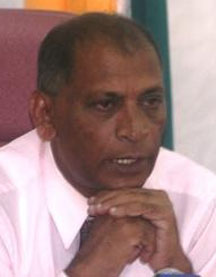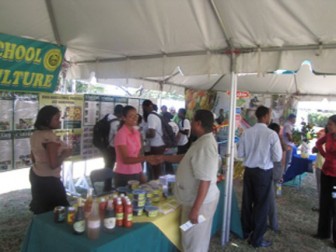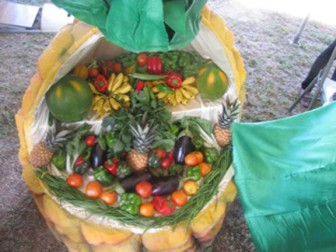– Ramsammy
With an annual bill of US$200M, Agriculture Minister Dr Leslie Ramsammy says that Guyana’s food importation is unsustainable.
Ramsammy made this statement at the World Food Day 2012 exhibition and open day the ministry and its affiliates hosted on its lawns on Wednesday, the Government Information Agency (GINA) said.
“There is no reasonable chance for local farmers and producers,” he was quoted as saying, while noting that several foods grown locally are imported.

Critics have been making this same point for a number of years and have contended that the government has not taken measures to address this problem. Two of the top food imports would be potatoes and onions and the critics have argued that despite a much vaunted Grow More Food Campaign that cost the country millions, the government has still not put in place a programme to either grow those or promote substitutes that would appeal to the market.
Trinidad has done both – investing in growing top imports like onions and carrots while also promoting sweet potato as a substitute for French fries. Barbados has also been working on this front by growing tomatoes on a larger scale for tomato paste and pushing sweet potatoes. Jamaica is also trying to address this problem.
The last word from the Ministry of Agriculture was that there were test plots in the interior for potatoes and onions but nothing has been heard about their success or lack of success. Critics note that the PPP/C has had 20 years to devise policy on this front and implement, especially as the country with lead responsibility for the Jagdeo Initiative on agriculture.
While the official World Food Day theme, ‘Agricultural cooperatives – key to feeding the world,’ was the focus of the Food and Agriculture Organisation (FAO) of the United Nations, the local theme was ‘Better Technology, Better Farming, Ensuring Food Security’. Both themes were brought to bear at the open day activity the ministry held to raise awareness and understanding about the approaches to ending hunger.
GINA said that Ramsammy told the open day that while Guyana is “food secure” it must not become complacent and must take steps to sustain food security in the light of climate change, and to use modern technology to add value to products for more economic gain.

The minister also noted that there are pockets of persons who are not “food secure” as sometimes the supply and distribution chain fails.
However, he said certain achievements in the food sector must be celebrated. “Malnutrition has been reduced drastically across the country to single digit percentages and Vitamin A deficiency which has plagued other countries around the world, no longer exists in Guyana,” he said, adding that these statistics must be maintained.
Ramsammy also praised farmers’ achievements but suggested that food security be used for further economic gains by exporting value-added products. He revealed that work is ongoing to add value to products to meet international standards, namely through processing and packaging. The Guyana School of Agriculture has been identified for this task and the Guyana Shop will be the outlet used to promote the products.
Ramsammy also acknowledged that some attempts to establish local food industries have failed, noting that several attempts to establish a dairy for milk production may have failed due to the poor production stock used. However, the Guyana Livestock Development Authority (GLDA) is currently mandated to work on improving livestock breeds for various purposes.

The minister also said there will be more interactive programmes for farmers and 20 farmers groups that have prepared business plans will be up for consideration for grants of up to $6M to implement with the possibility of access to more funds.
Krishna Seulall, a farmers’ representative from West Berbice who spoke at the Open Day, said that while Region Five is a large agricultural producing area, there are some serious challenges in adapting to climate change. Also, while cash crops farmers are doing well with assistance from the ministry, they, too, face challenges during the currently extreme dry weather.
Support
Also addressing the open day was Chief Co-operatives Development Officer in the Ministry of Labour Kareem Abdul-Jabar, who said agricultural co-operative societies are focused on addressing and improving the socio-economic needs of its members. This kind of co-operation offers a means to sustaining food security and is the platform for the world’s most vulnerable class of people to work from to their benefit.
Dr Lystra Fletcher-Paul, FAO representative in Guyana, in presenting the World Food Day Message of Director-General José Graziano da Silva, emphasized the need to work for the total eradication of hunger, while adding that many countries, in South America, Africa and Asia, are proving that it is possible.
The Director General threw his weight behind cooperatives as a major way to lift small-scale farmers out of poverty and hunger. Although they produce most of the food in many countries, it was noted that small-scale farmers had poor access to markets to sell their products, lack of bargaining power to buy inputs at better prices and a lack of access to financial services.
“Agricultural cooperatives can help smallholders overcome these constraints,” Dr Fletcher-Paul quoted da Silva as saying. “Cooperatives play a crucial role in generating employment, reducing poverty, and improving food security, and contributing to the gross domestic product in many countries.”
The FAO chief urged governments to do their part and “create conditions that allow producer organisations and cooperatives to thrive.” While agriculture and co-operatives are natural allies, and there is the means for the elimination of hunger and malnutrition, what is needed is an enabling environment, he also said.
In addition, Wilbur Garnett Representative of the Inter-American Institute for Co-operation on Agriculture (IICA) reiterated his organisation’s commitment towards helping Guyana in capacity building for improving market access for small producers and agro-processors.
The IICA is also working with stakeholders to promote better usage of technology in the sector and to supervise the various agricultural groups and co-operatives.




